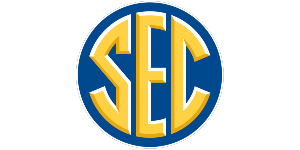Texas A&M’s Ethan Gogulski Overcomes Testicular Cancer to Shine at SEC Championships
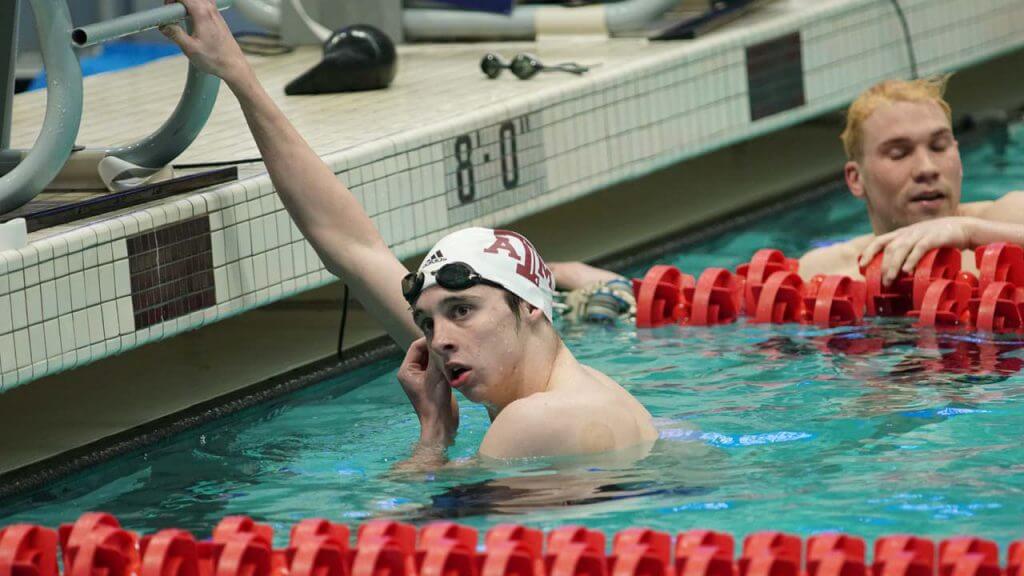
Ethan Gogulski’s introduction to college swimming had been a dream. In his first season after arriving at Texas A&M from Cedar Park, Texas, Gogulski had crushed his best times in all of his events at his first mid-season invitational. By the start of February, he had earned himself a spot on the Aggies’ SEC championships squad, an honor he never expected at the start of the year.
“At Texas A&M, the coaching staff is awesome,” Gogulski said. “They really know how to get you better. I showed up in the fall, and I just felt like I got into a groove. I knew what they put me in would benefit my swimming style and the events that I swim. After all that and after the mid-season invite, I realized that it was really working for me.”
Before November, Gogulski had never broken 4:32 in the 500 free, 49 in the 100 back or 1:45 in the 200 back. By the end of the Art Adamson Invitational, his lifetime bests stood at 4:27.73, 48.29 and 1:42.94, respectively.
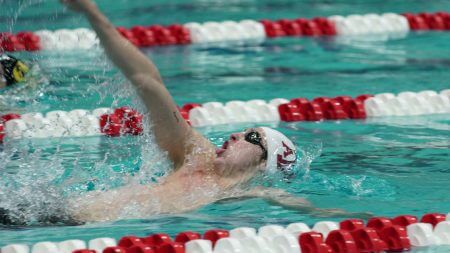
Photo Courtesy: Connie Yelle / Texas A&M
Then, exactly one week before the team was to depart for Georgia for the conference championships, “we got thrown a curveball.” Gogulski had testicular cancer.
“It was a lump and some swelling,” Gogulski said. “I did what I probably shouldn’t have done, which was going on google and looking up symptoms and being like, ‘Oh, it’s this, or it’s that.’ My dad’s a doctor, so I texted him, and I was like, ‘I noticed this. I think I should get it checked out. It doesn’t seem right.’”
On that early February Sunday afternoon, Gogulski had his suspicions confirmed. He had previously dealt with setbacks around the time of big meets—about a year earlier, Gogulski had to have his appendix removed while traveling to Iowa for Winter Junior Nationals—but cancer made all those previous issues and even swimming itself seem small.
During that initial appointment, Gogulski’s mother, Kim, brought up the impending swim meet.
“‘Is he going to be able, if he wants to, to go to SECs?’” Gogulski remembers Kim asking. “The doctor said, ‘Of course, if he wants to.’ Health was their No. 1 concern, that’s for sure, but I really wanted to go to SEC. I talked to the doctor, and it wasn’t their official recommendation, but they said that everything would probably be fine. They couldn’t really see anything getting worse in the two weeks that I would be gone.”
So after missing Monday morning practice, Gogulski was back at practice with the Aggies that afternoon. The team knew about the diagnosis, but while he was at the pool, nothing seemed any different than before.
“It was weird,” Gogulski said. “It wasn’t that hard. I thought it was going to psych me out. You don’t find something like this out a week before the meet and still do great, but when I was with my team, I wasn’t thinking about it. I felt completely normal. I knew something was wrong with me, but when I wasn’t thinking about that, it was swimming as usual.”
Aggies coaches Jay Holmes and Jason Calanog emphasized that if Gogulski still wanted to go to SECs, he needed to stay in the proper competitive mindset, but that was no problem for the freshman. Calanog connected Gogulski with Olympian Nathan Adrian, also recently diagnosed with testicular cancer, and Adrian provided reassurance in a series of text messages.
And then, still less than two weeks after his diagnosis, Gogulski travelled to Athens, Ga., and swam the best meet of his life.
===
As any swimmer can acknowledge, few results bring about more frustration than first alternate. On day four of the SEC championships, Gogulski ended up as first alternate by one hundredth. And just like every other first alternate in swimming, he was annoyed—even if he had cut another half-second from his lifetime best and recorded a time of 47.72.
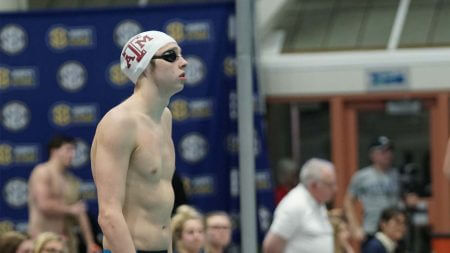
Photo Courtesy: Connie Yelle / Texas A&M
Even with surgery to remove the cancer scheduled for two days after the meet, Gogulski managed to make the meet seem normal. Even cancer couldn’t make first alternate sting any less, and it couldn’t dampen his enthusiasm for the 200 back, what Gogulski calls his “bread-and-butter event,” on the meet’s final day.
“I knew I just had to keep my head in the game,” Gogulski said. I got in the zone right before prelims, and I went 1:41.52.”
That big time drop left Gogulski in ninth place after prelims, and that evening, he took his spot in lane four in the consolation final. Florida senior Brennan Balogh jumped out to an early lead, but Gogulski clawed his way in front on the last 50 and held off Missouri’s Daniel Hein to touch first in 1:41.35.
“I’m proud of myself for continuing through the meet and still doing well,” Gogulski said. “It was one of those things where no matter what happens, you can always swim fast. It’s a good motivator that I finished the meet and did well, knowing I had what was going on with me and knowing what was going to happen in a few days once the meet was over.”
A few hours later, Gogulski flew back to Texas with his Aggie teammates. The next day, his grandparents picked him up from College Station to take him home. The following day, Gogulski woke up at 5:30 a.m. to eat a bowl of cereal, the only food he would be allowed before his 4 p.m. surgery. He slept most of the day before going in to have his cancerous growth removed.
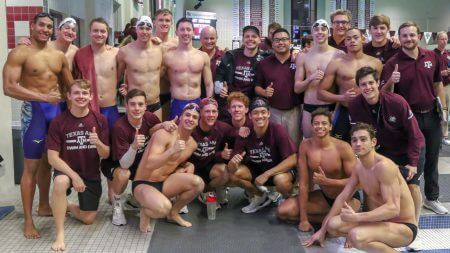
Photo Courtesy: Texas A&M Athletics
In the days since, Gogulski has been at home recovering. The surgery, which was “definitely a lot more painful than I anticipated,” was apparently successful, but he is still awaiting blood work to confirm that he is cancer-free.
The most daunting obstacle remaining is the mass of makeup school work awaiting Gogulski after two weeks away from campus. So long as his wound from the surgery is not too painful, he will be able to swim within another week or so.
And then, Gogulski hopes, the cancer scare will be behind him. He will look back on February 2019 with pride, as he should. Staring directly at a truly scary situation, he handled everything with poise and aplomb.
“It’s just a reminder that there are setbacks, but you can jump over them,” Gogulski said. “It’s not always the end of the world.”




